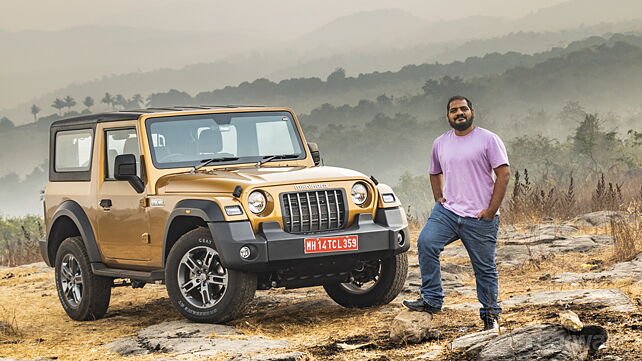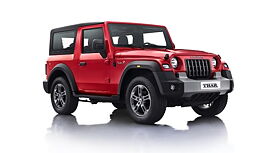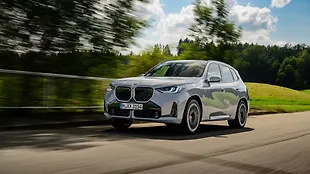Why would I buy it?
- Lower entry price
- Automatic convenience
- Road presence
Why would I avoid it?
- Petrol engine isn’t frugal
- Not for the purists
What is it?

The current-gen Mahindra Thar has many firsts. Apart from getting a petrol engine, an automatic option, it also offers a lot of creature comfort which the previous-gen Thar could only dream of. It became a go-anywhere lifestyle vehicle which was bought only to be restricted as a ‘pavement princess’. Hardly has any Thar ever reached its full off-road potential – except in the hands of the handful of purists. For everyone else, the Thar 2WD is here.

First, it is more affordable than the 4WD version – almost Rs 2.33 lakh cheaper in this petrol-automatic hardtop guise. Second, those who don’t need their Thar to be extreme off-roaders and will be sufficing to city commutes, highway runs, and very few escapades where the roads cease to exist – this Thar 2WD makes for a viable choice. But currently, it's available in just three variants and with two engine options. Appearance-wise, there’s no 4x4 badge on the rear-three-quarters. And two new paint options are added as well – the Blazing Bronze as seen in pictures here and an Everest White which should look interesting in flesh.

Is the cabin of the Mahindra Thar RWD any good?

Climb up into the Thar RWD and the biggest change noticeable here is the lack of a stubby low-range gear stick which usually sits beside the gearlever. The slot vacated is now smartly converted into a cubby hole which conveniently houses my 6.7-inch smartphone. There are a few minute changes though, which will be noticeable only to those who have spent some considerable amount of time in the new Thar before.

These little changes include the omission of one USB port (there used to be two) which is a Type-A. The traction control and hill descent control buttons are moved to the empty toggle switches from the right side of the steering, and the engine start-stop button is moved to that panel instead. There are some changes to the MID too, and it doesn’t display the 2H/4H/4L anymore. Similarly, the ‘Adventure’ app on the infotainment screen also omits the off-road display but thankfully it does offer some levels of ‘rough road’ data like roll and pitch angles apart from a compass and steering angle.

Besides this, the rest of the cabin is the same as you’d see in the 4x4 version. You have the same commanding position towering above the other road users. Upright windscreen and large mirrors provide a good view all around the car. Then, the seat comfort leaves me wanting more, owing to the narrow seat base and extended bolsters. Similarly, the backrest could have provided more support at the top since spending long hours in the seats could induce shoulder strain (which I experienced in the Mahindra Adventure Royal Escape).

On the upside, there’s more than generous head and shoulder room. As for rear passengers, the seat recline is a helpful reprieve, if you are planning to spend more than a few hours at the back. However, taller passengers would still find it difficult to be commodious, more so because of the lack of thigh support and foot room. Lastly, the boot is good enough for a couple of small carry-ons before you can fold down the rear seats.

Feature-wise, our car came with a seven-inch touchscreen infotainment system with Android Auto and Apple CarPlay with six speakers, auto start-stop function, cruise control, electric ORVMs, and remote central locking. On the safety front, there are dual airbags, ABS with EBD and ESP, hill assist, and ISOFIX. Moreover, this Thar has secured four stars on the GNCAP test. That said, for this update, the addition of a few more convenience features like wireless charging, an armrest and a dead pedal for the driver, and some creature comfort for the rear passengers would have elevated the experience.
Is the Thar RWD nice to drive?

We have already sampled the 2.0-litre mStallion engine in the Thar before and found it to be refined, vibration-free, and packing a punch. In this RWD avatar, there are no changes to the four-cylinder’s output, which is still 150bhp and 320Nm, and neither has the six-speed torque converter (which is the sole gearbox choice for now) been altered in any way. This means the power delivery remains smooth and linear while offering a good amount of grunt right from the word go.

Even the NVH remains well under control when wrung hard, and the TGDi feels like a properly modern engine. Despite being a petrol engine, the torque supply lower down the rev range is more than ample and for highway cruising speeds the engine would be comfortable churning away under 2000rpm. Puttering around city traffic, the petrol engine gives no reason to complain either.

Then, the automatic gearbox is quite responsive as well but you could feel it working the clogs, be it in kick-down or upshifts. On the flip side, the fuel efficiency has been a chink in the Thar petrol’s armour. To negate the lower fuel efficiency, the auto-start stop function has been provided. We weren’t able to do our regular fuel efficiency run this time, but the MID read 10kmpl on average throughout the day where we spend the majority of hours in the city, the highway runs to and fro from our shoot location, and a little bit of rough roading.

That brings us to the potential beyond the paved roads. When the civilization ends, the Thar RWD could still ramble on unfazed. The off-road angles and articulation remain unchanged here. And there’s barely any trail that the Thar 4x4 couldn’t conquer before shifting to the 4H or 4L ratio. So, the rear-wheel-driven Thar can still cross rivers, go over boulders and gravels, and across the wilderness. But hardcore off-road fanatics would surely scorn the idea of rear-axle-powered Thar. In fact, it would need the skill of battle-hardened off-roaders to unstick this Thar 2WD where the 4x4 version would slither through.

As for the ride, the ladder-frame construction makes the Thar a rugged campaigner over any road surface you throw its way. However, we know this version of Thar is intended to be used more on paved roads rather than the beaten path, the ride isn’t tuned for it. It still hops and skips in the usual body-on-frame SUV manners, and won’t be as comfortable as it should be for your trip to the club or office commutes.

But with a stern determination, you can ride flat-out over any crater-ridden road you venture upon. With no axle upfront, the steering is slightly less heavy than the 4x4 version, but it’s still on the hefty side for a city slicker and isn’t progressive either. It has good highway stability but offers an arm workout when manoeuvring in the urban jungle.
Should you buy the new Mahindra Thar RWD?

As mentioned above, the Thar RWD carries a huge price dip compared to the equivalent 4WD version. While the price benefit is Rs 2.33 lakh for the petrol, the single diesel version for the RWD is almost Rs 4.22 lakh more affordable than the equivalent 4WD. Also, with this, the pricing of the Thar RWD comes down to the sub-four metre SUV's price range – making it even more enticing. However, this is also a crossroads between purists and practicality.

Now, to find a middle road, we could consider the fact that you should buy a 4x4 only because you need one on a regular basis, instead of finding a reason to go trail hunting because you have bought yourself a 4x4. Bottom line is, if you simply want to buy a Thar for its big and bold road presence, its lifestyle SUV persona, and don’t mind its reduced capability beyond the paved roads, go for the 2WD without a second thought.
Pictures by Kapil Angane

































